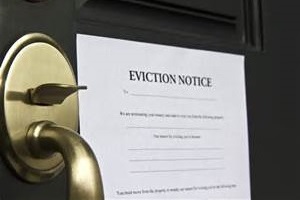
EVICTIONS
A tenant with a lease is protected from eviction during the lease
period so long as the tenant does not violate any substantial provision
of the lease or any local housing laws or codes. For both
regulated and unregulated apartments, landlords must give formal notice of their
intention to obtain legal possession of the apartment. Unless the
tenant vacates the premises by a specified date, the landlord may
commence eviction proceedings through: (a) a summary non-payment court
proceeding to evict a tenant who fails to pay the agreed rent when due
and to recover outstanding rent, or (b) a summary holdover proceeding for eviction if a tenant significantly violates a substantial obligation under the
lease (such as using the premises for illegal purposes, or committing
or permitting a nuisance) or stays beyond the lease term without
permission.
[Real Property Actions and Proceedings Law (RPAPL) § 711]
Notice Requirements
Your landlord can evict you for several reasons, but must provide notice. The first type occurs when your landlord wants to evict you for certain prohibited conduct. The landlord will first have to let you know, in writing, that the eviction is coming. This is called a 10-day Notice to Comply. The landlord will have to give you a chance to correct the violation before continuing with the eviction case.
The second type occurs when your landlord wants to evict you for nonpayment of rent. This type of case is called a “non-payment” proceeding. The landlord must give you a written rent demand before starting the proceeding. This is called a 14-day Notice to Pay. If the tenant pays the rent amount in full prior to the end of 14th day, the eviction process will be stopped and the tenant will be allowed to remain in the rental unit.
The next type of eviction occurs when the landlord choses not renew your lease. This type of eviction is called a "holdover proceeding." The landlord must provide the tenant with a written 30, 60, or 90-day Notice to Quit. The amout of notice depends on the length of the tenancy.
Notice of Petition
If the issue is not resolved, the landlord will serve you a document called a Petition and Notice of Petition, which is the legal document that tells you where and when you need to appear in court. The Petition and Notice of Petition must be served on the tenant 10-17 days prior to the hearing date, allowing the tenant time to prepare. A tenant should never ignore legal papers; an eviction notice can still be issued if a tenant did not appear in court to answer court papers (petition) sent by the landlord.

Judgment of Possession
A tenant can be legally evicted only after the landlord has brought a court proceeding and has obtained a Judgment of Possession. If the court finds for the landlord, it will issue a "Writ of Execution." The Writ of Execution gives the tenant a maximum of 14 days to vacate the property before they are forcibly removed from the rental unit by a marshal, sheriff or constable. Only a sheriff, marshal or constable can carry out a court-ordered warrant to evict a tenant.
Landlords may not evict a tenant by use of force or unlawful means. For example, a landlord cannot use threats of violence, remove a tenant’s possessions, lock the tenant out of the apartment, or willfully discontinue essential services such as water or heat. When a tenant is evicted, the landlord may not retain the tenant’s personal belongings or furniture. The landlord must give the tenant a reasonable amount of time to remove all belongings. In all cases, the landlord will have to follow the law that may apply to your situation and the terms of your lease. Your landlord is not allowed to simply lock you out or remove your belongings from your apartment. This is called “self-help” and is not permitted.
Illegal Evictions
A tenant who is evicted from an apartment in a forcible or unlawful
manner is entitled to recover triple damages in a legal action against
the landlord. Landlords who use illegal methods
to force a tenant to move are also subject to both criminal and civil
penalties. Further, the tenant may be entitled to be restored to
occupancy.
[RPAPL § 853; NYC Admin. Code § 26-523, § 26-521]



